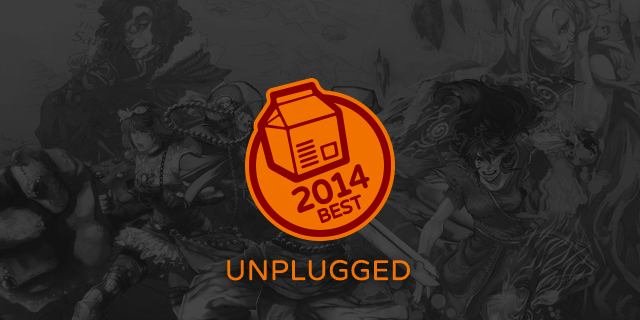
As is apparently tradition, it seems that my analog gaming year was much better than my digital one. Writing my official Staff Picks list (running tomorrow) often feels more like a question of “do I even have ten games to list this year?” than it is which ones were my legitimate favorites. That is never the case for this list, as I usually keep a year-long draft on my BoardGameGeek profile that changes constantly as new games arrive and older ones fall out of favor. This list is also not always entirely about the current year, due to vagaries concerning actual US release dates versus European releases, Kickstarter bonuses or even when I simply first become aware of the game in question. At least this year, I have already talked about every game that made the list, which has rarely been the case in the past!
Honorable Mention: Pairs
As I said last month, the base version of Pairs won’t be winning any awards, and that certainly isn’t changing here. But several of the variants are truly both inspired and inspiring. I fully expect this deck of cards with a triangular distribution to become as useful a design tool as the familiar four-suit poker deck. Pairs might just be the stocking-stuffer of my choice for years to come.
10. A Study In Emerald
Pure deckbuilders have sort of faded for me in the last year or so, although I still have a fondness for the genre. Martin Wallace has recently taken to implementing deckbuilding as just one part of a few of his games. A Study In Emerald is one such hybrid, adding elements of area control, hidden roles and some good old-fashioned Lovecraftian insanity to craft one of the most distinctive experiences I’ve had all year. One of these days, I really need to read the Neil Gaiman short story that inspired this, but until then, I’ll be on the lookout for the right group and the right time to pull this out again.
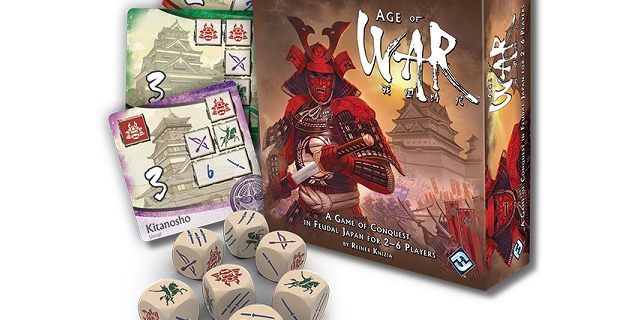
9. Age of War
It’s no secret that dice and I don’t get along. When I do enjoy a dice game, it is often because the action is so quick that I don’t have time to build a strategy for the randomness of several spiteful cubes to ruin. Reiner Knizia’s Age of War is one such fast-paced challenge of conquest that never manages to outstay its welcome. As a bonus, it even makes Risk tolerable at the same time! Give this one a shot and you won’t be disappointed.
8. Tiny Epic Kingdoms
With certain exceptions, I like my board games to be done in a timely manner. As a result, I’ve generally steered away from 4X games just due to the sheer time commitment required for most. This makes Tiny Epic Kingdoms perfect for players like me, as you get almost all of the experience of a traditional 4X in the space of about half an hour. You can even pack it with you for trips or conventions, which is more than can be said for something like Twilight Imperium.
7. Sentinels of the Multiverse: Vengeance
Greater than Games had an incredibly productive year, although their two new products (Galactic Strike Force and Sentinels Tactics) didn’t quite take hold with me personally. Fortunately, I’m still a fan of Sentinels of the Multiverse, and its mega-expansion, Vengeance, added an interesting twist with an entire team of villain decks to take down. It’s always an experience when members of the Vengeful Five show up (my group tends to pick our villains randomly), but they’re not so different that they make the game feel too strange. I hope we get a few more of these down the road.
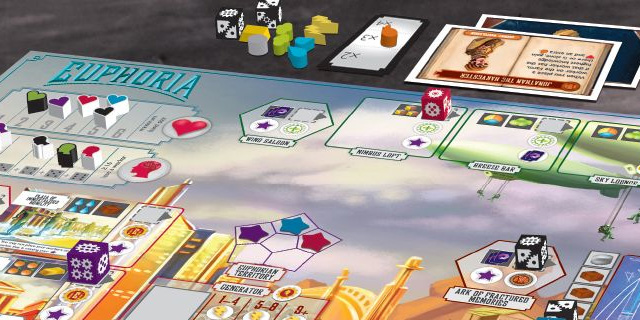
6. Euphoria: Build a Better Dystopia
I wanted to put Euphoria higher on this list, but a recent play reminded me of why I could not do so in good conscience. Designers Jamey Stegmaier and Alan Stone did a commendable job of using dice as workers without letting randomness dictate strategy, but one of the few elements they left in — rolling doubles allowing a player to place more than one worker per turn — causes undesirable swings when it happens. I still enjoy everything else about the game and am usually willing to play it (although perhaps not with six players), but every time someone is luckier than I am and effectively gets several turns ahead of me as a result will be a reminder of why I might not always want to.
5. Five Tribes
The best thing I can say about Five Tribes is that I haven’t been able to play it nearly enough. There are so many different paths to victory, and I want to try them all. Every decision is important, every action changes the game, and every time you play you see more options. I expect to come back to the this one several times next year.
4. Gravwell: Escape from the 9th Dimension
Man, Gravwell is still just so much fun to play despite is simplicity. The best part of “programming” games like this is watching someone get completely derailed by the actions of another player. Even when that someone is you, it’s still hilarious. Carefully managing your boosts while trying to out-guess your opponents is a dance that never gets old.
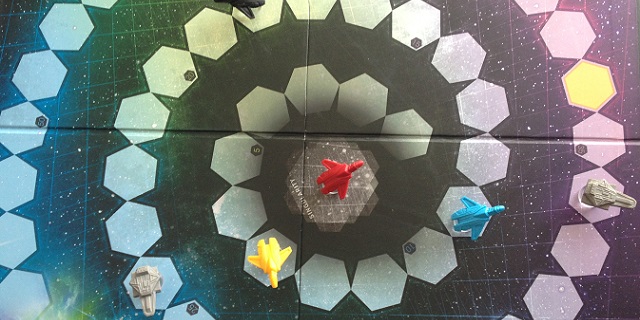
3. Caverna: the Cave Farmers
Uwe Rosenberg’s Agricola was one of my favorite games of 2008. It’s still one of the most popular modern board games to this day. Its pseudo-sequel, Caverna, is better in several ways. There are fewer surprises and the options are much wider, leading to stronger strategies that are still varied enough to offer something for everyone. And in this case, “everyone” can mean as many as seven players, as long as you don’t mind a little extra downtime between turns.
2. Star Realms
I mentioned earlier that deckbuilders have kind of cooled off for me this year. In all honesty, that might be because Star Realms distilled it down to near-perfection. Taking the best elements of Ascension and mixing in some Magic: the Gathering direct conflict, Star Realms is a lightning-fast skirmish that avoids the usual deckbuilder trap of “multiplayer solitaire” by not lasting long enough to have actual down time between turns.
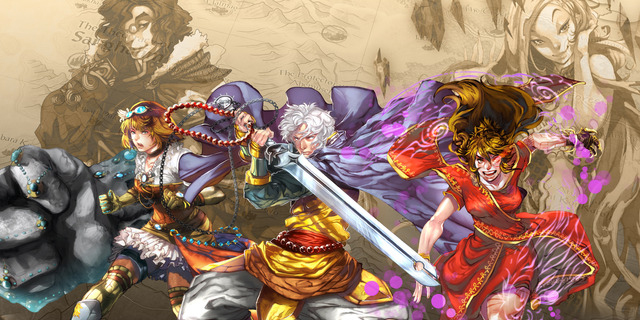
1. BattleCON: Devastation of Indines
As good as Star Realms is, there was always one other two-player game I would much rather have been playing this year: BattleCON. Unfortunately, Star Realms often won out due to simplicity and time considerations, but it could never hope to meet the depth and options contained in the Devastation of Indines box. Anyone who appreciates a good mental exercise, reading your opponent and tournament fighting games in general owes it to themselves to visit the World of Indines one way or another.
Hmm… A fighting game with an insane amount of options and streamlined gameplay finishing highly on my Favorites of 2014 list? Why does that seem familiar? Eh, I’m sure it’s just a coincidence.



















